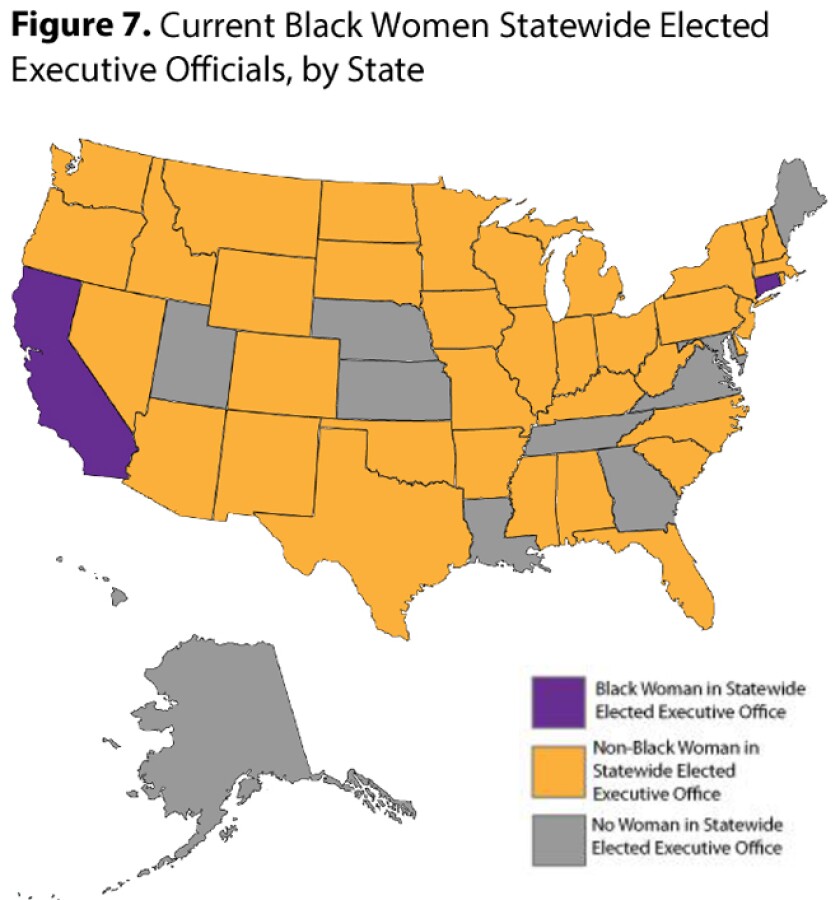Just 10 black women in nine states have ever held an elected executive office position and all but one -- former Wisconsin Secretary of State Vel Phillips -- took office after 1992. They've served as secretaries of state, attorneys general, state treasurers and lieutenant governors -- but no black woman has ever been elected governor (and few have even run). According to the report from Rutgers University’s Center for American Women and Politics and the Higher Heights Leadership Fund, that's likely because of the “dearth of black women in lower statewide office." Two-thirds of all female governors have previously held statewide office.
Black women make up 7 percent of the U.S. population but just 3 percent of Congress, less than 1 percent of statewide elected executive officials, less than 4 percent of state legislatures, and 2 percent of mayors. In the nation's 100 biggest cities, only four -- Baltimore, San Antonio, Toledo, Ohio; and Washington, D.C. -- have a black female mayor.
At the state legislative level, Georgia and Maryland rank first and second for having the highest proportions of black women in their legislatures. Black women make up about 17 percent of their state populations and 12 percent and 11 percent of their legislatures, respectively. In New York, the 2014 and 2015 elections made the legislature much more representative of black women who nearly doubled their numbers from 10 to 19 in office.
States in the South fare the worst when it comes to legislative representation for black women. In Mississippi, black women make up 9 percent of the state legislature but 20 percent of the population; in Louisiana, they make up 6 percent of the legislature but 17 percent of the population.

The numbers have improved slightly since before the 2014 election when black women gained representation in Congress and cities, and may improve more because four women announced they're running for statewide executive offices -- two of them in Missouri, which has never elected a black woman statewide.
But the issue isn’t just about numbers.
Research has shown that black women’s voices are the most likely to be overlooked in policymaking, according to Rutgers University’s Kelly Dittmar, the report’s author. Increasing black women’s representation, she said, is essential to “promoting policy priorities, perspectives and solutions that may be lost."
In her recent book Sisters in the Statehouse, Nadia Brown chronicles black women’s influence in the Maryland legislature on issues like domestic violence, marriage equality and elder care. She notes that because black women are more likely than white women to be victims of domestic violence, it increases the chance that black female lawmakers will have personally experienced or witnessed abuse. That experience has a direct impact on their interpretation and approach to legislation, Brown said. “These voices are necessary within a deliberative body because they help convince their legislative colleagues to prioritize the concerns of domestic violence victims,” she concluded.
In Baltimore, District Attorney Marilyn Mosby (who is among the 1 percent of all elected prosecutors who are women of color) told protesters outraged over the death of Freddie Gray, a 25-year-old black man who died while in police custody, that she heard their calls for “no justice, no peace.” Mosby acted faster than any other lead prosecutor in recent police brutality cases and swiftly filed charges against the six police officers involved in Gray’s arrest.
Outside of political institutions, the Black Lives Matter movement began with three black women in 2012 as a response to the fatal shooting of Trayvon Martin, an unarmed black teenager in Florida. The movement has since illuminated issues of police brutality in the black community.









